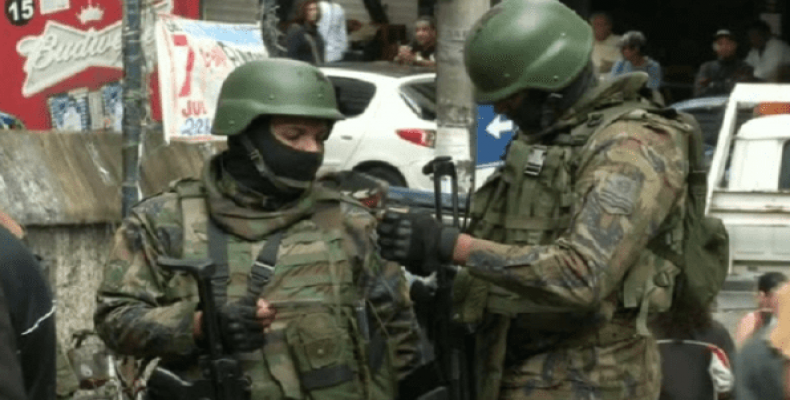Rio de Janeiro, July 13 (RHC)-- Some 4,000 troops have been patrolling the Pavao-Pavaozinho, Cantagalo, Babilonia and Chapeu Mangueira favelas in the southern area of Rio de Janeiro. Local media reported helicopters had flown over the area and shots were fired in the Pavao-Pavaozinho favela in the Copacabana neighborhood by alleged armed traffickers.
Troops have been instructed to avoid entering favelas but to keep a close watch along the exteriors where 70,000 people live in small homes littered along a steep hillside that overlooks a wealthy part of the city.
In February, the federal government dispatched the army to assume full control of police forces in the state of Rio de Janeiro. The move was in response to increased violence, which has "virtually taken over," according to Senate-imposed President Michel Temer.
Former President Dilma Rousseff characterized the intervention as a means to create an enemy, which "in Brazil's case, is poor Black people who live in periphery neighborhoods... It's not white people who live in Ipanema nor in Leblon."
The number of massacres in Rio de Janeiro, Brazil, has doubled since military intervention was launched, according to a report published last month by the Intervention Observatory at Candido Mendes University.
Home to some 140,000 residents, soldiers previously occupied the community between 2014 and 2015, as part of the Brazilian government's military intervention in the lead up to and after the Rio World Cup.
Brazilian troops sweep Rio favelas despite history of police killings

Articles en relation
Commentaires
Laissez un commentaire
Tous les champs sont requisPlus de visites
- Les Etats-Unis ne pardonnent pas ceux qui ne font pas de concessions idéologiques
- Le président du Parlement sri-lankais reçoit l'ambassadeur cubain
- Lettre de Petro à Trump : « Je ne veux pas d'esclavagistes à côté de la Colombie, nous en avons déjà eu beaucoup et nous nous sommes libérés »
- Cuba nie la présence de membres de l'ELN sur son territoire
- Opération Northwoods », le plan de bombardement par lequel les États-Unis voulaient justifier leur invasion de Cuba

